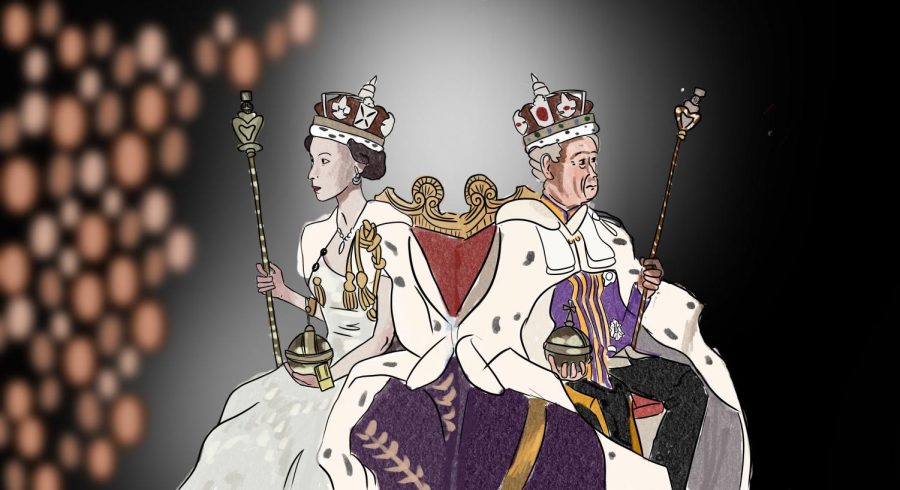Alone on the throne
King Charles’ coronation was attended by approximately 2,200 people. While over 70 years ago Queen Elizabeth reined in over 8,000 attendees for her coronation. The decline in loyalty to the royal family has been on a downhill path for the past several decades. The reasons vary from anger toward the monarchy to disinterest in the historic traditions.
May 31, 2023
2,200 people, 400 representatives, 203 countries, and one throne. On Saturday, May 6, 2023, King Charles and his wife Camilla were crowned King and Queen, at Westminster Abbey, London. The ceremony was conducted by Justin Welby, the Archbishop of Canterbury. The Ceremony saw His Majesty King Charles III crowned alongside the Queen Consort. The Coronation reflected the monarch’s role today and looked towards the future, while also being rooted in long-standing traditions and pageantry.
The last coronation before this one took place over 70 years ago, but in those 70 years, a divide has formed between the royal family and their status in the world’s eyes. A recent study commissioned by the BBC through YouGov, conducted ahead of the event, found that the majority of young Brits are “not interested” in the royal family and believe the newly-anointed king is “out of touch.” Yet several controversies around the royal institution have nabbed significant headlines as some view the monarchy itself to be outdated.
Senior Esmé Talenfeld, finds that the pageantry of the coronation is an ill-timed event. “I think that having a multimillion dollar ceremony while the U.K is currently in a cost of living crisis does not paint a good picture. The whole tradition is rooted in this prehistoric rhetoric,” she said.
Other students, such as, Josh Barshay ‘23, were not even aware that Britain’s most historic occasion was taking place. “I didn’t even know there was a coronation,” Barshay said.
Not only did many citizens refuse to participate in this revelry, famous music stars including Adele, Harry Styles, The Spice Girls and Robbie Williams all allegedly rejected an invitation to perform at the coronation concert, possibly because of the royal family’s “PR disasters.”
“The royal family has faced a number of PR disasters in recent times, and anyone performing at the show would have to consider whether there would be a backlash from appearing amongst their fans,” Simon Jones, a publicist for Little Mix, Niall Horan and Louis Tomlinson, told Rolling Stone in March.
Even Britain’s citizens themselves have collected a multitude of reasons for not watching or participating in this grand ceremony. Reasons range from feeling that the coronation wastes public money, is not worth the energy of participating, not thinking Charles deserves to be king and the fact that the monarchy has no place in modern society. The latter dispute is a contention for many in the younger generations. According to the British Social Attitudes Surveys, which regularly asks how important or unimportant it is for Britain to have a monarchy, the numbers have dropped significantly in the last 30 years. Before 1994, on average, 66 percent of citizens said having a monarchy was “very” or “quite” important. But after the divorce then death of Princess Diana, the “very important” description of the monarchy fell to below 30 percent.
After three of the late Queen Elizabeth’s children decided to separate from or divorce their partners, the “royal family” was no longer seen as very royal nor familial. Since the late nineties, the need for a monarchy has been an ever-increasing question, and the coronation of King Charles has only furthered the division between history and society. As we begin and continue to view the work of the newly appointed King Charles, the attitude towards the monarchy will remain unsteady in an already erratic world.




